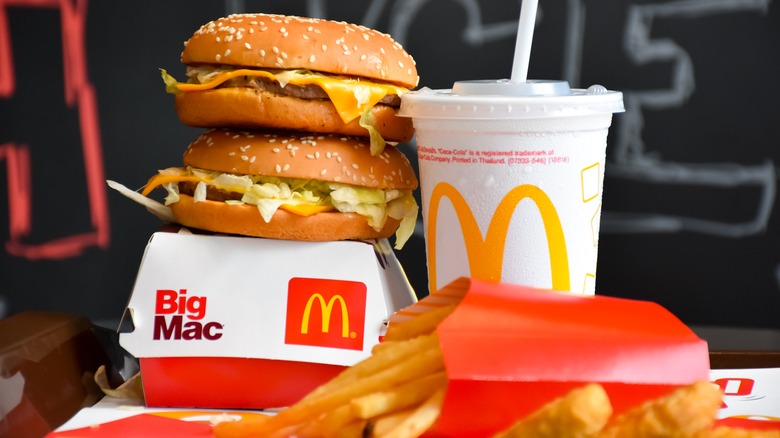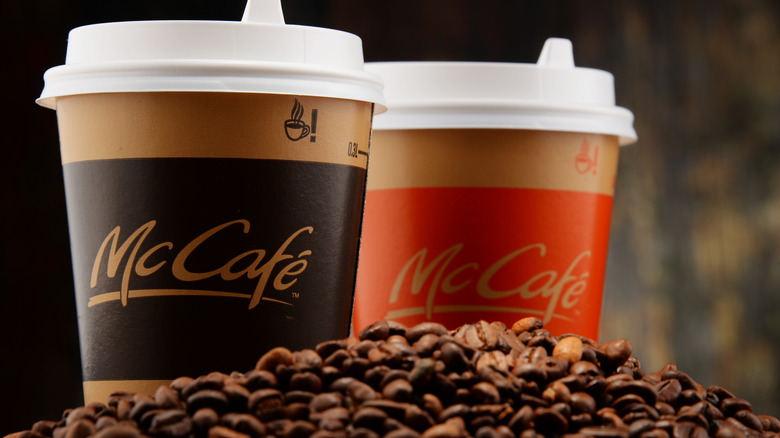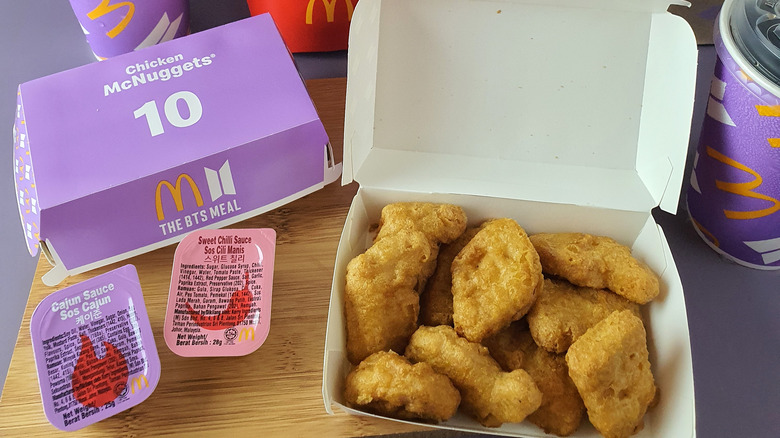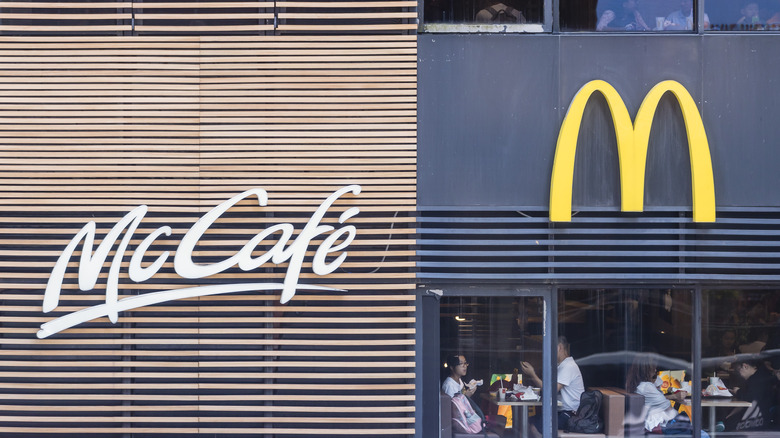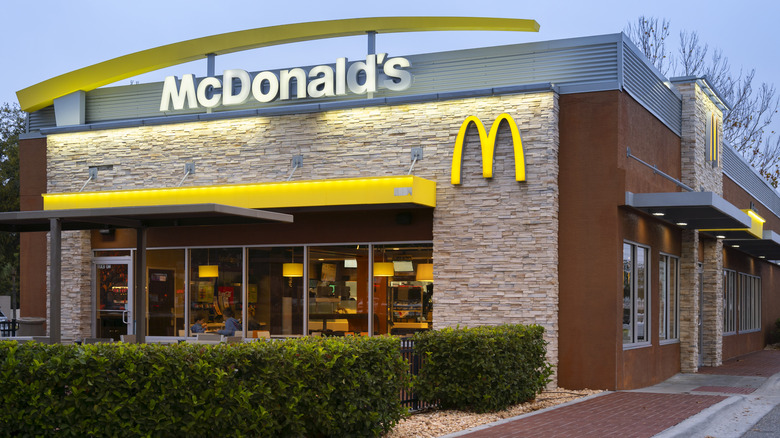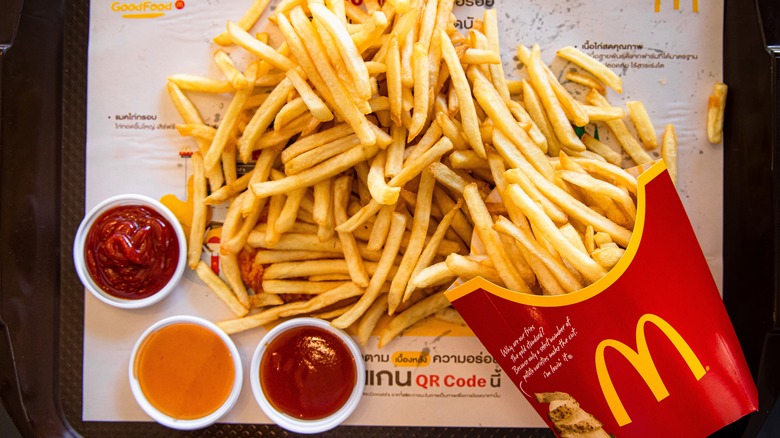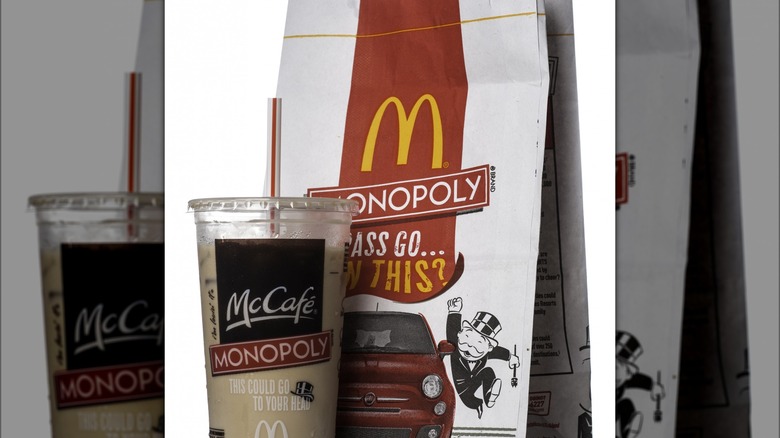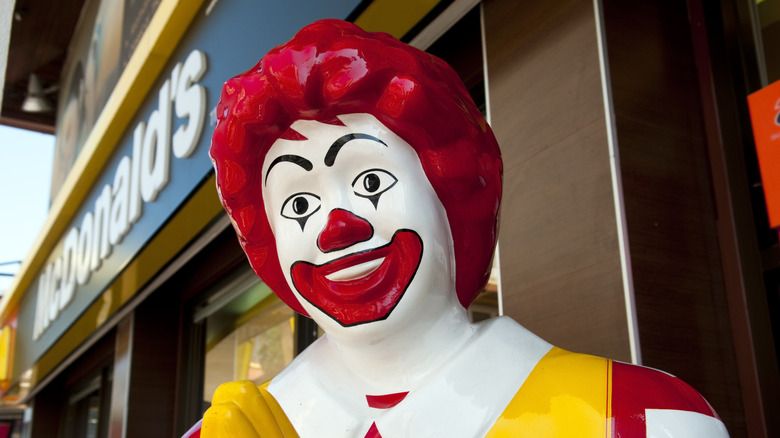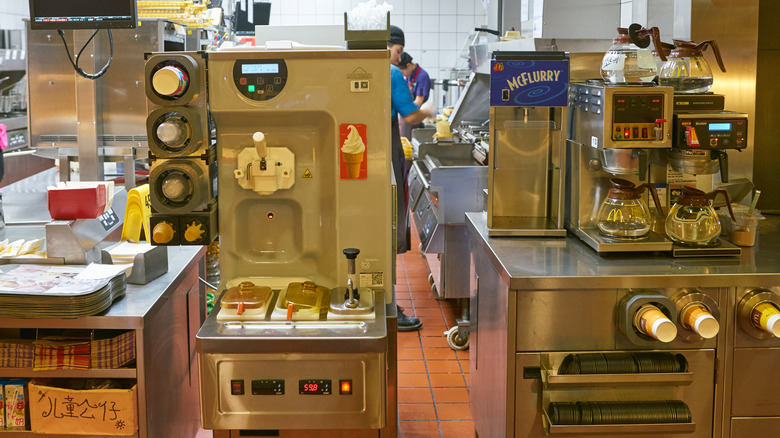McDonald's Lawsuits That Cost The Company Millions
When you think about McDonald's, you likely think about golden arches and chicken McNuggets. It's usually a solid option for a quick and tasty meal. Unfortunately for a few unlucky folks, that's not what they got when they chose to eat at Mickey D's. One woman's spilled coffee became the face of litigation against the fast food giant in America. Another man chipped his tooth on a McNugget and needed extensive dental work — even though the nuggets are supposed to be boneless. While it's easy to think that people who sue fast-food restaurants are just looking to make a quick dollar, many plaintiffs receive huge sums because they actually deserve them. These McDonald's lawsuits cost the company millions because the victims needed extensive medical care and compensation for lost wages.
In some cases, McDonald's acted with so much malice that juries awarded victims punitive damages. This is extra money trial winners receive over and above what was owed, due to the inconvenience or extremity of the case. The purpose of punitive damages is to punish the defendant — and McDonald's has had to pay out more than once. Although McDonald's has an in-house legal team to deal with all the potential lawsuits, the corporate giant still has seen its fair share of massive losses. Here are a few famous cases that cost the company millions.
A woman became a pop culture legend over a hot coffee
This classic coffee case is one of the most, if not the most, famous McDonald's lawsuits ever. In 1992, a then 79-year-old woman named Stella Liebeck purchased a cup of coffee from a McDonald's drive-thru in Albuquerque, New Mexico. She was the passenger in the car, not even the driver. The driver pulled away from the window and parked in the parking lot. Liebeck opened the cup of coffee to add in the cream and sugar when the hot coffee spilled all over her lap.
This incident has since been painted as the poster child for frivolous lawsuits in most American pop culture; however, Liebeck was severely injured. She received third-degree burns over 16% of her body and required significant medical treatment, including skin grafting and whirlpool treatment. Contrary to the narrative that Liebeck was greedy, she initially tried to settle for $20,000 to cover her medical bills and loss of income. However, McDonald's countered with only $800.
The jury, so incensed by McDonald's lack of action despite 100s of prior cases, awarded $2.7 million in punitive damages (later reduced to $480,000) with a final confidential settlement arranged between the two parties. One juror said that McDonald's had a "callous disregard for the safety of the people" because it consciously served coffee it knew was too hot for consumption, according to California Attorney's of California.
A man sued after cracking his tooth on a McNugget
Imagine biting into a crispy, savory McNugget and cracking your tooth! This happened to Alexei Stolfat of Palm Beach, Florida. In 2020, Stolfat ordered his meal via Uber Eats. After receiving the order arrived at his home, he settled in to enjoy his meal but was suddenly stuck with pain in his jaw. The source of the pain? A bone that was nearly an inch long. Over the next few days, the pain became steadily worse, so Stolfat went to the dentist who told him his tooth contained multiple cracks and would need to be replaced. Stolfat did not have insurance, making this endeavor very expensive.
When asked about his lawsuit, he was very clear that it wasn't a quick money grab. "I'm not looking to be famous in this case or something like that," Stolfat told TODAY. "I want to help other people, to protect them and tell them to be very careful with McNuggets." It is made very clear on the McDonald's website that Chicken McNuggets are made from boneless chicken. Stolfat finding a bone in his nugget means something went very wrong, which was the basis of the $1.1 million lawsuit.
A customer sued after falling in a McDonald's restaurant
The McDonald's in Kahului, Hawaii was ordered to pay $5.67 million to Beverly and Ruben Munguia after the couple sued in the U.S. District Court. In 2007, the couple stopped at McDonald's for breakfast along with other family members. After placing their order, the family sat down and Beverly stood up to get drinks. She then slipped on a wet spot on the floor and fell, very hard, on her rear end. She fell with such force that she fractured her L-1 vertebra in her lower back, causing her extreme pain, according to court documents.
As a result of the injury, Munguia needed to have surgeries on her back to place metal rods to support her spine. Unfortunately, this also caused her L-4 vertebra to fracture as well. Due to the extreme pain and many surgeries, Munguia would likely always need a walker or wheelchair and be "permanently disabled from work." The overall nature of the injuries and long-term effects negatively impacted her lifestyle and overall mental, physical, and emotional health. The settlement covered Munguia's initial medical bills, the costs of her ongoing treatments, and her lost wages.
A woman alleges she was served chemicals instead of coffee
In December 2020, Sherry Head ordered a coffee at McDonald's in Dothan, Alabama. However, instead of the caffeinated drink, Head alleges that she was served chemicals. This is because when she ordered a caramel macchiato, Head claims she was originally told by the drive-thru employees that they couldn't make her one as the machine was currently down for maintenance. Employees later apparently said that they were almost finished cleaning the machine, so they could make the drink after all. Yet, Head alleges that when her drink finally came out, it was just cleaning chemicals instead of coffee.
When imbibed, the drink caused severe pain in her throat. "I took a sip, and immediately my mouth and throat went numb, and then started burning. Now I have permanent scarring in my throat and may need corrective surgery," Head told KTLA. When she realized something wasn't right, Head went back through the drive-thru for help, yet the employees supposedly were not willing to help her. Instead, Head alleges that the manager aggressively shut the window in her face. When she called 911 and EMTs arrived, McDonald's staff apparently did not show responders the chemicals used to clean the coffee machine so they could treat Head. Due to this alleged negligence, Head filed a lawsuit against McDonald's for a total of $13 million.
McDonald's lost millions to a fair pay suit in California
In January 2013, McDonald's employee Maria Sanchez filed suit against the company for violating labor laws. A year later, David Cruz, Ines Mendez Merino, and Jonathan Valentin also joined the lawsuit with the same concerns as Maria. In 2017, the group won its case. The court ruled that McDonald's Restaurants of California was responsible for not properly paying workers. The court said that McDonald's had to pay the plaintiffs $750,000 as damages and penalties under the California Private Attorneys General Act. Then in 2020, the court gave final approval to a class action lawsuit of $26 million. This settlement was for workers at McDonald's restaurants in California as hourly employees, excluding managers dating back to January 24, 2009.
As part of this agreement, McDonald's committed to changing how it keeps track of work hours and providing training about pay policies for both managers and hourly employees at its corporate-owned restaurants in California. McDonald's corporate also agreed to give new uniforms to hourly employees when their old uniforms become worn out. This was so they didn't have to pay to clean their own uniforms.
A franchise owner won millions in a discrimination case
Former professional athlete Herbert Washington sued McDonald's in 2021 for racial discrimination and won. Washington, an African-American man, had owned and operated McDonald's franchises in Ohio since the 1980s. His lawsuit alleged that McDonald's corporate intentionally made it more difficult for him to succeed as a franchise owner compared to his white counterparts. It also alleged that since he spoke up about the discrimination, he was punished by McDonald's. The revenue of his restaurants suffered because of it. One way McDonald's corporate is said to have done this is by pulling back on advertising in Black communities that might have visited Washington's stores.
Instead of taking the suit to court, McDonald's decided to settle for $33.5 million instead. It did this by purchasing each of Washington's locations. However, McDonald's was adamant that settling this case was in no way admitting fault. "Discrimination has no place at McDonald's," said a corporate statement given to CNN. "While we were confident in the strength of our case, this resolution aligns with McDonald's values and enables us to continue focusing on our commitments to the communities that we serve."
The Monopoly giveaway scandal
McDonald's has been running its annual Monopoly giveaway since 1987. Each year, players collect game pieces to score big prizes. It's supposed to be a game of chance. The more McDonald's you buy, the more likely you are to win. However, Jerry Jacobson noticed that he didn't need to play by the rules. Jacobson worked for the company that supplied McDonald's with the game pieces at the time of his fraud.
He allegedly supplied people with the pieces they needed to win big cash prices in exchange for a portion of their winnings. For more than a decade, Jacobson's scheme helped crown McDonald's Monopoly winners. However, in 2001, he was finally busted by the FBI, as were over 50 of his accomplices. Although McDonald's was not stung by the ensuing lawsuit, the company still did lose millions of dollars. To make it up to the customers who played the game the right way, the chain gave $10 million to over 50 people.
As a part of a later class action, the chain was also required to give 15 random people $1 million each to make it right."We made a commitment to return this money to our customers that should have been part of the prize pools,” Douglas Freeland, then the U.S. marketing director for McDonald's, told The New York Times. ”With the second giveaway, we will have done that."
Early McDonald's characters were a copyright infringement
McDonald's characters like Ronald McDonald and the Hamburgler are classic and much-loved fast food mascots. However, the origins of the characters are steeped in controversy and a million-dollar lawsuit for the company. In 1977, there was a legal battle between Sid & Marty Krofft Television Productions, Inc. and the McDonald's Corporation. The lawsuit hinges on the similarities between early McDonald's personality Mayor McCheese and a character created by the production company that McDonald's didn't actually pay for, called H.R. Pufnstuf.
Since McDonald's used Mayor McCheese extensively in advertising campaigns, Krofft Television Productions alleged that it was copyright infringement. The ad agency Needham, Harper & Steers pitched a campaign to McDonald's but had come to Krofft for a consultation prior to the pitch. However, the ad agency told Krofft that McDonald's was going in another direction creatively, but then the burger giant used the ideas anyway without paying for them. McDonald's character Grimace also pops up in the shoot, as he looks a bit too much like another character created by the production house. In the end, the court agreed there was clear intellectual property infringement. Because of this, McDonald's had to pay the Kroftts a total sum of $1,044,000. In today's dollars, that is over $5 million.
A tech start-up sued over damage to business
Tech company Kytch worked hard to create and sell a device that could fix the often broken ice cream machines at McDonald's. Then, in November 2020, McDonald's sent emails to all its restaurant owners, telling them to take the Kytch devices out of their ice cream machines right away. The emails alleged that the Kytch gadgets broke the ice cream machines' warranties and could even be dangerous, which Kytch claims is not true. Then, in 2022, the two founders of Kytch, Melissa Nelson and Jeremy O'Sullivan, demanded at least $900 million to make up for the damage they say they've suffered. In their complaint, they say McDonald's made false claims in its advertisements and messed up their business contracts with customers.
These Kytch devices were supposed to help McDonald's succeed by catching the ice cream machine's internal messages and sending them to a website or smartphone app. This way, location managers could figure out problems faster than normal (problems that are so well-known they've become a joke among McDonald's customers). "They've tarnished our name. They scared off our customers and ruined our business. They were anti-competitive. They lied about a product that they said would be released," Nelson told WIRED. "McDonald's had every reason to know that Kytch was safe and didn't have any issues. It was not dangerous, as they claimed. And so we're suing them."
